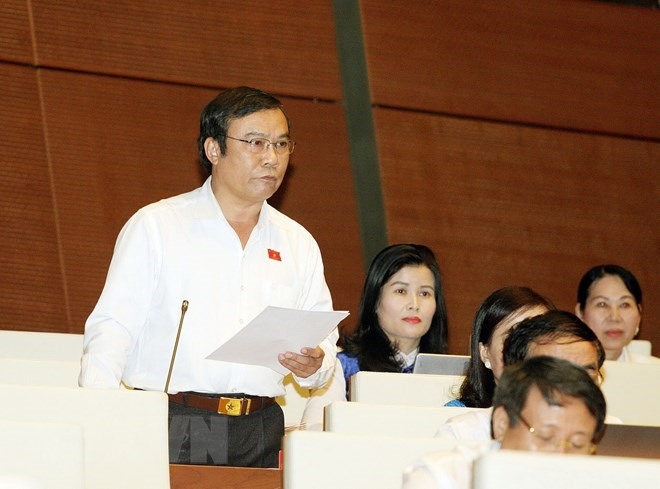 Politics & Law
Politics & Law

The last working week of the National Assembly (NA) kicked off on Monday with debates on the draft revised law on the execution of criminal judgments.
 |
| The last working week of the National Assembly (NA) kicked off on Monday with debates on the draft revised law on the execution of criminal judgments.— VNA/VNS Photo |
HÀ NỘI — The last working week of the National Assembly (NA) kicked off on Monday with debates on the draft revised law on the execution of criminal judgments.
The draft law makes amendments to the organisation of job training and work for inmates in which these activities can be organised outside of prisons instead of only inside prisons as stated in the current law. The locations of employment outside prisons will be determined by ministers of public security and defence.
Deputy Nguyễn Tạo from Lâm Đồng Province is of the opinion that organising job training and assigning jobs to inmates at locations outside prisons would pose a high risk to public security as inmates might escape.
Deputy Mai Thị Phương Hoa from Nam Định Province said that allowing prisoners to work outside prisons would help them get used to employment and better adapt to social life after they finish their sentence.
This is a really important condition for the inmates to re-integrate into society, she said.
The current regimes of payment for inmates’ daily lives and work remain at a minimum, she added.
“When inmates work outside prisons, they can make highly-profitable products, improve their own lives and reduce the burden on prisons,” she said.
According to the current law, inmates’ labour, after deducting necessary costs, will go towards their rations; contribute to the prison community integration fund; and welfare and reward funds; rewarding inmates; and re-investing into the prison.
Inmates are allowed to send money earned from overtime work and during holidays to their relatives, deposit it with prisons’ safekeeping services, use them under regulations or get them back upon completion of their sentence.
According to deputy Hoa, the advantage of the proposal is that after their sentence, prisoners may be employed by companies where they have already worked.
However, she noted that the regulation should not be applied to all inmates but only those who are of working age, in a good state of health, have nearly finished their service and have demonstrated good behaviour.
It should not be applied to inmates who have committed serious crimes such as drug trafficking, homicide and robbery. Prisons and enterprises must ensure safe conditions while taking the inmates out and allocate separate zones for inmates to work. Inmates are entitled to work contracts, payment and supervision following regulations stated in international labour conventions to which Việt Nam is a member, she said.
Deputy Hoàng Thị Thu Trang from Nghệ An Province said that regulations related to the enforcement of sanctions on commercial legal entities are too vague.
For example, according to the draft law, law enforcement agencies collaborate with State management agencies to summon representatives of the commercial entities to announce the criminal judgment decision. In case the representatives do not show up and evade the judgments, the measures taken to address the case remain too general, the deputy said.
NA deputies shared the opinion that the law on execution of criminal judgments aims to ensure the implementation of the Constitution, Law on Penal Code, other related laws and serve as a legal foundation for the courts’ decisions, proposing that the draft revised law be considered at this 6th session and the 7th session of the NA, and approved at the 8th session.
Later the same day, five bills were approved by the assembly. They are the revised Law on Amnesty, Law on Crop Production, Law on Animal Husbandry, Law on Việt Nam Coast Guard, and Law on amendments and supplements to a number of articles of Law on Higher Education.
The 14th NA is scheduled to wrap up its on-going sixth meeting today. — VNS




